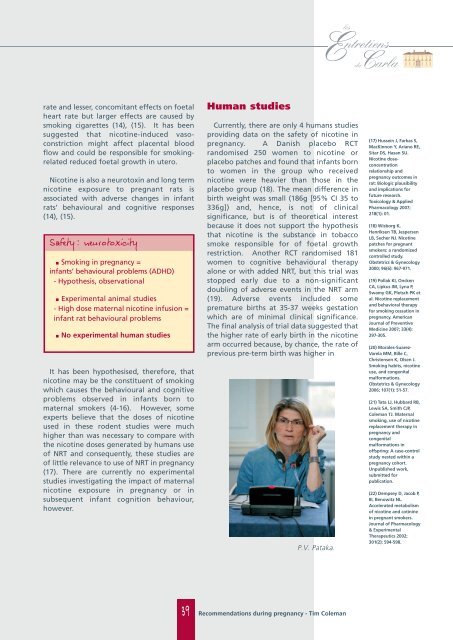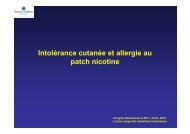Nicotine replacement therapy … - Carlos A ... - Entretiens du Carla
Nicotine replacement therapy … - Carlos A ... - Entretiens du Carla
Nicotine replacement therapy … - Carlos A ... - Entretiens du Carla
Create successful ePaper yourself
Turn your PDF publications into a flip-book with our unique Google optimized e-Paper software.
ate and lesser, concomitant effects on foetal<br />
heart rate but larger effects are caused by<br />
smoking cigarettes (14), (15). It has been<br />
suggested that nicotine-in<strong>du</strong>ced vasoconstriction<br />
might affect placental blood<br />
flow and could be responsible for smokingrelated<br />
re<strong>du</strong>ced foetal growth in utero.<br />
<strong>Nicotine</strong> is also a neurotoxin and long term<br />
nicotine exposure to pregnant rats is<br />
associated with adverse changes in infant<br />
rats’ behavioural and cognitive responses<br />
(14), (15).<br />
Safety:neurotoxicity<br />
■ Smoking in pregnancy =<br />
infants’ behavioural problems (ADHD)<br />
- Hypothesis, observational<br />
■ Experimental animal studies<br />
- High dose maternal nicotine infusion =<br />
infant rat behavioural problems<br />
■ No experimental human studies<br />
It has been hypothesised, therefore, that<br />
nicotine may be the constituent of smoking<br />
which causes the behavioural and cognitive<br />
problems observed in infants born to<br />
maternal smokers (4-16). However, some<br />
experts believe that the doses of nicotine<br />
used in these rodent studies were much<br />
higher than was necessary to compare with<br />
the nicotine doses generated by humans use<br />
of NRT and consequently, these studies are<br />
of little relevance to use of NRT in pregnancy<br />
(17). There are currently no experimental<br />
studies investigating the impact of maternal<br />
nicotine exposure in pregnancy or in<br />
subsequent infant cognition behaviour,<br />
however.<br />
Human studies<br />
Currently, there are only 4 humans studies<br />
providing data on the safety of nicotine in<br />
pregnancy. A Danish placebo RCT<br />
randomised 250 women to nicotine or<br />
placebo patches and found that infants born<br />
to women in the group who received<br />
nicotine were heavier than those in the<br />
placebo group (18). The mean difference in<br />
birth weight was small (186g [95% CI 35 to<br />
336g]) and, hence, is not of clinical<br />
significance, but is of theoretical interest<br />
because it does not support the hypothesis<br />
that nicotine is the substance in tobacco<br />
smoke responsible for of foetal growth<br />
restriction. Another RCT randomised 181<br />
women to cognitive behavioural <strong>therapy</strong><br />
alone or with added NRT, but this trial was<br />
stopped early <strong>du</strong>e to a non-significant<br />
doubling of adverse events in the NRT arm<br />
(19). Adverse events included some<br />
premature births at 35-37 weeks gestation<br />
which are of minimal clinical significance.<br />
The final analysis of trial data suggested that<br />
the higher rate of early birth in the nicotine<br />
arm occurred because, by chance, the rate of<br />
previous pre-term birth was higher in<br />
P.V. Pataka.<br />
39 Recommendations <strong>du</strong>ring pregnancy - Tim Coleman<br />
(17) Hussein J, Farkas S,<br />
MacKinnon Y, Ariano RE,<br />
Sitar DS, Hasan SU.<br />
<strong>Nicotine</strong> doseconcentration<br />
relationship and<br />
pregnancy outcomes in<br />
rat: Biologic plausibility<br />
and implications for<br />
future research.<br />
Toxicology & Applied<br />
Pharmacology 2007;<br />
218(1): 01.<br />
(18) Wisborg K,<br />
Henriksen TB, Jespersen<br />
LB, Secher NJ. <strong>Nicotine</strong><br />
patches for pregnant<br />
smokers: a randomized<br />
controlled study.<br />
Obstetrics & Gynecology<br />
2000; 96(6): 967-971.<br />
(19) Pollak KI, Oncken<br />
CA, Lipkus IM, Lyna P,<br />
Swamy GK, Pletsch PK et<br />
al. <strong>Nicotine</strong> <strong>replacement</strong><br />
and behavioral <strong>therapy</strong><br />
for smoking cessation in<br />
pregnancy. American<br />
Journal of Preventive<br />
Medicine 2007; 33(4):<br />
297-305.<br />
(20) Morales-Suarez-<br />
Varela MM, Bille C,<br />
Christensen K, Olsen J.<br />
Smoking habits, nicotine<br />
use, and congenital<br />
malformations.<br />
Obstetrics & Gynecology<br />
2006; 107(1): 51-57.<br />
(21) Tata LJ, Hubbard RB,<br />
Lewis SA, Smith CJP,<br />
Coleman TJ. Maternal<br />
smoking, use of nicotine<br />
<strong>replacement</strong> <strong>therapy</strong> in<br />
pregnancy and<br />
congenital<br />
malformations in<br />
offspring: A case-control<br />
study nested within a<br />
pregnancy cohort.<br />
Unpublished work,<br />
submitted for<br />
publication.<br />
(22) Dempsey D, Jacob P,<br />
III, Benowitz NL.<br />
Accelerated metabolism<br />
of nicotine and cotinine<br />
in pregnant smokers.<br />
Journal of Pharmacology<br />
& Experimental<br />
Therapeutics 2002;<br />
301(2): 594-598.






